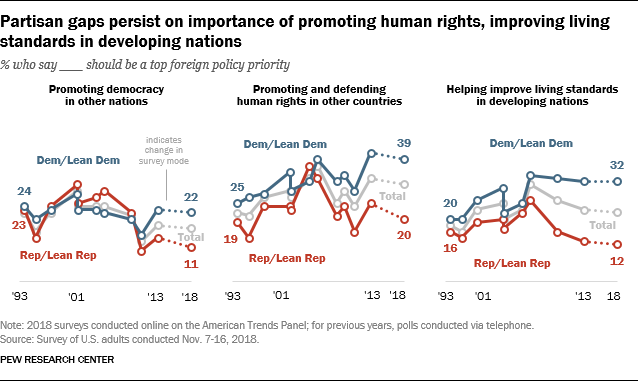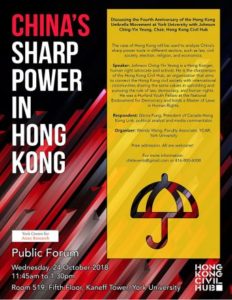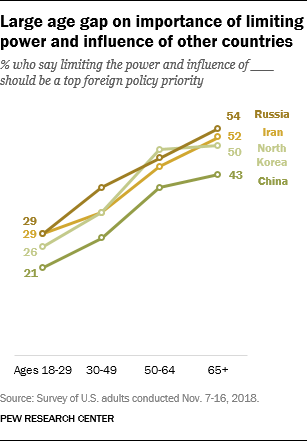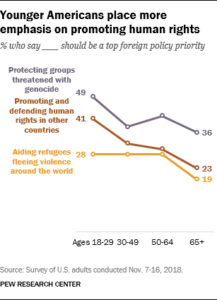
China is committed to promoting its authoritarian model throughout the world as a superior alternative to Western democracy, says a leading commentator, but U.S. public opinion is divided on the threat posed by autocrats’ sharp power, a new survey suggests.
In its strategic competition with western liberal democracy, China boasts that one-party rule enables long-term planning and follow-through, The Washington Post’s Fred Hiatt observes:
It can complete huge infrastructure projects without pesky citizen opposition or time-sucking environmental studies. It can offer loans to small-country dictators without bothering about corruption, transparency or human rights. Its huge internal market, shielded from outside competitors, nurtures homegrown companies. Its vast storehouse of data on every citizen, collected without permission or respect for privacy, gives its companies an invaluable resource.
 China’s record of development over the past four decades is astonishing, Hiatt concedes. But the United States can counter by using assets Beijing lacks: alliances, diversity, governance, and liberty, he writes.
China’s record of development over the past four decades is astonishing, Hiatt concedes. But the United States can counter by using assets Beijing lacks: alliances, diversity, governance, and liberty, he writes.
Beijing is actively deploying its sharp power against Hong Kong, adds Joshua Wong, the secretary general and co-founder of Demosisto, a Hong Kong-based political party. China’s goal is to create a new international order governed not by shared values of human rights, but by the force of its economic might, he writes for the Post:
We see this in Xinjiang, Tibet, Macau, Taiwan and the South China Sea. But even larger and mightier nations such as the United States must contend with the threats posed by the new Chinese imperialism — and they are doing so from a morally weakened position if they set aside cherished and lasting values, including human rights and democracy, in favor of fleeting economic gains.

Pew Research Center
A new survey of U.S. public opinion on 26 foreign policy objectives indicates stark partisan priorities, distinct generational preferences and a strong focus on security, including economic security.
About seven-in-ten (72%) say that taking measures to protect the U.S. from terrorist attacks should be a top priority for the country, while about as many (71%) say the same about protecting the jobs of American workers, the Pew Research Center reports.
Partisan differences extend to threat perceptions of what a National Endowment for Democracy report calls authoritarian ‘sharp power’, the survey suggests:
Partisan opinions about limiting the power and influence of Iran and Russia are nearly mirror images: 52% of Democrats say reducing Russia’s power and influence should be a top priority, compared with 32% of Republicans. By contrast, 52% of Republicans rate limiting Iran’s power as a top goal, compared with 29% of Democrats. Reducing China’s power and influence is not a leading goal for either party, but more Republicans (39%) than Democrats (26%) rate this as a top priority. There is greater partisan agreement on North Korea: 43% of Republicans and 35% of Democrats say limiting North Korea’s power and influence is a top priority.
 “Among the public overall, attracting skilled workers from other countries (16% top priority), promoting democracy in other countries (17%) and finding a solution to the conflict between Israel and the Palestinians (18%) rank near the bottom of the long-range foreign policy goals,” Pew adds. “However, for each of these items – indeed, for all 26 priorities in the survey – majorities say they should be given top priority or some priority…… Though neither party rates the promotion of democracy in other nations as a particularly high priority, Democrats are twice as likely as Republicans to say this should be a top foreign policy goal (22% vs. 11%).”
“Among the public overall, attracting skilled workers from other countries (16% top priority), promoting democracy in other countries (17%) and finding a solution to the conflict between Israel and the Palestinians (18%) rank near the bottom of the long-range foreign policy goals,” Pew adds. “However, for each of these items – indeed, for all 26 priorities in the survey – majorities say they should be given top priority or some priority…… Though neither party rates the promotion of democracy in other nations as a particularly high priority, Democrats are twice as likely as Republicans to say this should be a top foreign policy goal (22% vs. 11%).”
There are a few issues that younger people place greater importance on than older adults, Pew adds:
About half (49%) of those ages 18 to 29 say the U.S. should make protecting groups or nations threatened with genocide a top priority; fewer of those 65 or older (36%) say the same. Younger people are 18 percentage points more likely than the oldest adults to say that promoting and defending human rights in other countries should be a top priority (41% vs. 23%). When it comes to aiding refugees fleeing violence around the world, those younger than 65 are more likely than those ages 65 and older to say this should be a top foreign policy priority for the U.S.







